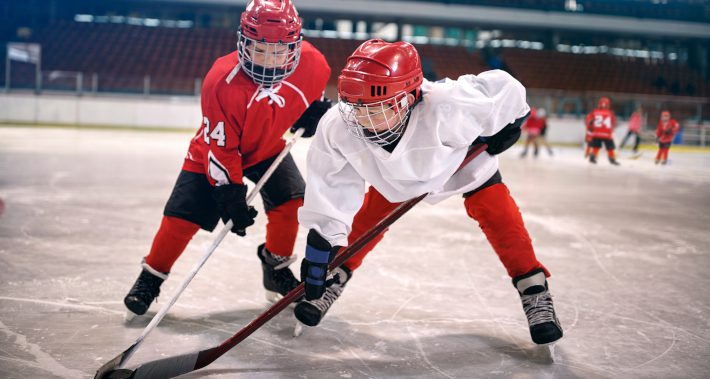
A concussion, which is a type of mild traumatic brain injury (mTBI), can be especially worrisome in kids and teens.
When a concussion occurs, a blow, bump or jolt to the head causes the brain to move rapidly within the skull, damaging brain tissues and causing cellular or neurochemical changes.
A child’s brain is particularly vulnerable to injury, as the disturbance that occurs as a result of a concussion can alter the brain’s developmental path.
If a concussion is suspected, and depending upon the severity or nature of the initial injury, parents are urged to bring their child to the emergency department or to his or her primary care provider for comprehensive assessment and diagnosis.
Despite a characterization as “mild”, a concussion can cause significant persistent symptoms, which are grouped into four clusters:
- Physical (i.e., headache, dizziness, light sensitivity, impaired balance, etc.);
- Cognitive and Communication (i.e., difficulty finding words and/or responding quickly in conversation, slurred speech, fatigue, etc.);
- Mood;
- Changes in Sleep. Persistent symptoms of concussion can be minimized if information regarding mTBI, including expectations for recovery and follow-up instructions, are immediately shared with parents.
Unfortunately, it is estimated that up to 30% of children aged 5-18 years remain symptomatic 30 days after their concussions.
If a child or teen’s symptoms persist, a Speech-Language Pathologist (S-LP) can assess a variety of clinical symptoms related to cognition (i.e., attention, memory, information processing, etc.) and communication (i.e., listening, speaking, reading, writing, etc.).
Direct therapy may be recommended, or coping strategies may be introduced by the S-LP at home and in the classroom.
Together, the family and S-LP will create a graduated plan for the child to return to school and/or other activities of daily living.
As parents, we strive to make informed choices regarding the activities in which our kids participate.
In recent years, parents and clinicians have come to understand the impact that contact sports (in which there can be “hits to the head”) may have on a child’s neurodevelopment.
It can be difficult to marry our child’s love of sport with what we now know are the inherent risks.
As a parent and S-LP, I plan to encourage my kids to participate in sport as safely as possible.
Thankfully, many leagues are taking steps to reduce the probability for contact and the risk of injury. In any case, if there is the potential for a diagnosed brain injury, however mild, this mom will be diligent in seeking early and all-encompassing assessment and intervention.
References:
“Concussion and Speech Language Pathology: How we can help.” (2016). The Ontario Association of Speech Language Pathologists and Audiologists.
Available at: https://sites.google.com/site/communicationinbraininjury/
“Guidelines for Diagnosing and Managing Pediatric Concussion.” (2014). The Ontario Neurotrauma Foundation.
Available at: http://onf.org/documents/guidelines-diagnosing-and-managing-pediatric-concussion
Additional Resources:
Play safe, kiddos!
Jessica Bristol,
Speech-Language Pathologist & Guest Blogger
372 Hollandview Trail, #302,
Aurora, ON L4G 0A5
(905) 503-4321
» https://goo.gl/maps/fg3XKnNsczzwLzTz7
Aurora Speech Clinic is located in Aurora, ON and offers personalized skilled intervention to those struggling with their speech and language skills. Services offered include screening, consultation, and comprehensive evaluation. We also provide one-on-one and/or group therapy for speech sound disorders, receptive/expressive language delay/disorder, stuttering/cluttering, accent reduction, and much more.